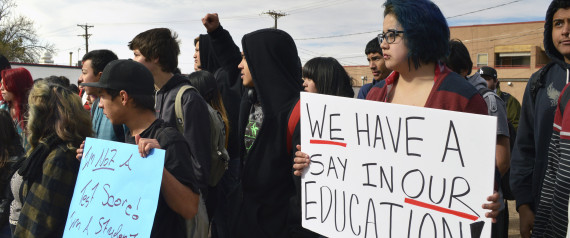Students Around The Country Are Opting Out Of Tests, Even If State Law Doesn't Allow It

Dolores Ramos, 16, right, joins dozens of Highland High School students in Albuquerque, N.M., as students staged a walkout Monday March 2, 2015, to protest a new standardized test they say isn't an accurate measurement of their education. Students frustrated over the new exam walked out of schools across the state Monday in protest as the new exam was being given. The backlash came as millions of U.S. students start taking more rigorous exams aligned with Common Core standards. (AP Photo/Russell | ASSOCIATED PRESS
In New Mexico this past week, over 2,000 students from Albuquerque Public Schools opted not to participate in standardized testing, after voicing their opposition to the exams with protests and walk-outs. In New Jersey, districts around the state also reported large numbers of opt-outs, with some school administrators calling the test resistance nearly unprecedented.
But in these places, state policy might not actually allow students to opt out of statewide testing, according to a new report from the Education Commission of the States. The report from the nonpartisan group outlines each state's policy on opting out of standardized testing, finding that in many cases, protocol is actually unclear and lacks enforcement.
In recent months, resistance to high-stakes standardized tests has reached a fever pitch, amid the rollout of exams associated with the Common Core State Standards. The Common Core State Standards are a set of education benchmarks that have been adopted in most states in an effort to make sure students around the country are learning at the same level. The standardized tests associated with the new standards are known for their increased rigor. This past week, a handful of states -- like New Mexico and New Jersey -- administered the exams.
The Education Commission report says that a few states give clear guidance on opting out: In California and Utah, state law expressly allows parents to prevent their children from taking standardized tests.
On the other end of the spectrum, state law in places like Texas and Arkansas clearly prohibits opt-outs.
In New Mexico, the Department of Education has said that state law requires all students to take state tests –- and mass opt-outs could end up impacting a school’s funding. But that hasn’t appeared to stop districts from implementing their own individual policies on the issue. In New Jersey, the Department of Education has sent guidance to school districts informing them that state policy requires students to take statewide assessments. However, this hasn’t seemed to stop kids from refusing to participate.
“In many states … the guidance as to whether opt-outs are allowed is far less clear, as departments of education are often silent on the issue,” says the report. “Additionally, many states have no consequences in place for not participating in mandatory assessments, adding a further wrinkle to defining what it means for states to truly prohibit opt-outs”
In sum, in many places, policy is murky.
"This is such a new issue, you could easily see how all of these policies are constantly evolving," Julie Rowland, one of the authors of the study, told Education Week.
However, as Education Week noted, activist groups like United Opt Out andFairTest/The National Center for Fair and Open Testing both work to provide their own guidance for parents who wish to keep children from taking state tests. FairTest, for example, has a list of contacts in most states who are knowledgable about the consequences of opting out in that area.
“In most cases, it is unplowed ground,” Bob Schaeffer, public education director of Students Around The Country Are Opting Out Of Tests, Even If State Law Doesn't Allow It:


